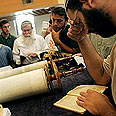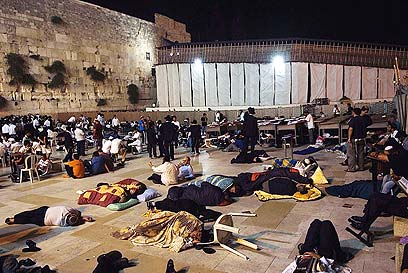
Tisha B'Av
None
Tisha B'Av, meaning the Ninth of Av, is Judaism's annual day of fast in memory of the destruction of the First and Second Temples in Jerusalem. According to Jewish belief, both temples were destroyed on the same day – 656 years apart. On the Gregorian calendar, the day falls on mid- July or early August.
According to Jewish tradition, five different events, known as the five calamities – warranting fasting, happened on the ninth of Av:
- The First Temple, built by King Solomon, was destroyed by the Babylonians led by Nebuchadnezzar in 586 BCE. The Judeans were sent into the Babylonian exile.
- The Second Temple was destroyed by the Romans in 70 CE, and the people of Judea were exiled from the Holy Land.
- God punished the Israelites who came out of Egypt for their lack of faith in him, refusing Moses' pleas and telling him they would enter the land: "… and the Lord replied, 'I have forgiven them, as you asked. Nevertheless, as surely as I live and as surely as the glory of the Lord fills the whole earth, not one of the men who saw my glory and the miraculous signs I performed in Egypt and in the desert but who disobeyed me and tested me 10 times – not one of them will ever see the land I promised on oath to their forefathers. No one who has treated me with contempt will ever see it," (Numbers 14:20-23)

The Western Wall on eve of Tisha b'Av (Archive photo: Israel Bardugo)
- Bar Kokhba's revolt against the Roman Empire in 135 CE, failed. Simon Bar Kokhba was killed and the city of Beitar was destroyed.
- Following the Bar Kokhba revolt, the Romans put a siege of Jerusalem and razed the city the following year.
Customs and traditions
Tisha B'Av carries the following restrictions: Fasting – No eating or drinking is allowed for 25 hours; Grooming – No washing, bathing or lathering is allowed; the wearing of leather shoes is forbidden; any displays of physical affection or intercourse is forbidden.
According to tradition, the studying of Torah – considered enjoyable, is forbidden as well. The only books allowed are the Book of Lamentations, the Book of Job, portions of Jeremiah and Talmud chapters pertaining to the law of mourning.
While fasting, it is customary to sit on low stools or on the floor, as is done during shiva – the seven days of mourning customary in Judaism. The period of the nine days preceding Tisha b'Av are known as The Nine Days: Orthodox Jews mark them as days of intense mourning.
According to Orthodox belief, Tisha B'Av will remain a day of mourning until the Messiah arrives, at which time it would turn into a great day of celebration, as stated in the bible: "This is what the Lord Almighty says: 'The fasts of the fourth, fifth, seventh and tenth months will become joyful and glad occasions and happy festivals for Judah. Therefore love truth and peace,'" (Zechariah 8:19)










